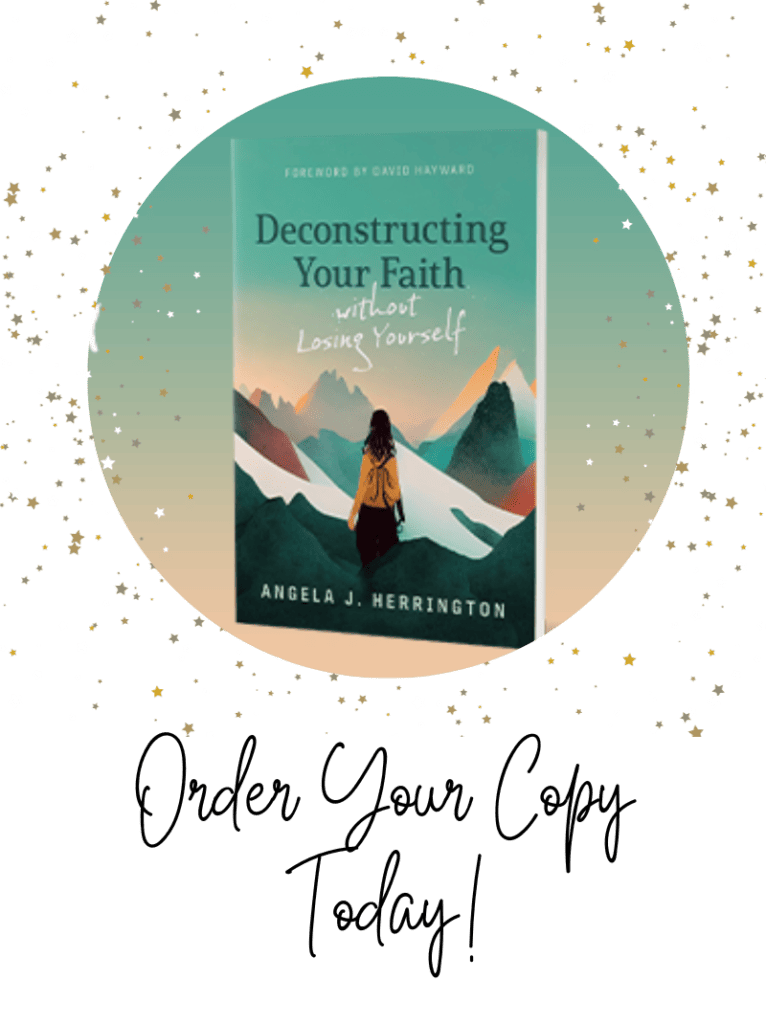During deconstruction, many of us step back from attending church, but some events like funerals, weddings, and holiday celebrations draw us back into spaces that feel risky. So, what do you do when you ‘need’ to go, but your body is panicking, or you aren’t sure what to say, how to act, or if you even want to go?
It’s important to remember you can always say no to an event and respectfully decline, but sometimes you need to be in a Christian space because it’s important to you or someone you love. With that in mind, let’s dive into six ways of navigating Christian events while deconstructing your faith.
Start by giving yourself permission to say “no” if attending is too painful.
There’s a phrase people say that says “‘No.’ is a one-word sentence,” but that doesn’t always feel accessible or appropriate, depending on the situation.
If you have sat with it and know you are not ready, or it won’t be possible to attend and be present and positive simultaneously, then allow yourself to release guilt for not going. Inform them you won’t be attending, reach out personally if you have the capacity, and let the people hosting the event know that you’re excited for them but feeling a little too raw from your journey and can’t come. You can also send regrets via email or the RSVP check box on the electronic or mail invitation. If you aren’t interested in sharing your deconstruction journey or explaining why it may be painful, you can say you have other plans that weekend or “I love you, but I can’t make it that day.” If you use the sick excuse the day of, make sure not to post pictures of you having fun out and about that day. Remember, you can elaborate on the no, but you don’t have to defend your no.
Ride out the feels.
Allow yourself to feel all the feelings without shaming yourself before, during, and after the event. Suppose you shove them down and plan on attending. In that case, you could accidentally start word vomiting at a table of strangers about why modern Christianity took a turn for the worse after Mary Magdalene got relegated to prostitute status (not that people don’t care, but there is a time and a place.) Allowing yourself to grieve and process also makes you less likely to fall into harmful habits that will help you avoid the pain and bypass your feelings.
Confide in a friend, use our Facebook Group, the Deconstructing Faith Cafe, to talk and get advice, or journal it out before and after you go. Your feelings are valid, but they can quickly get the upper hand if you don’t let yourself fully feel them.
Ask a friend for help when attending a Christian event you are nervous about.
You don’t have to do the event alone. Having a wing person who knows where you’re at and can run interference if you need a little space is wise. They’re great for switching conversation topics or deflecting the attention of people asking about why you are deconstructing your faith. They can also help you set a time boundary by telling you something urgent has come up, so, unfortunately, you must leave early (because you rode together, of course). If a plus one isn’t an option, perhaps you can call a friend before and after for a reminder that you are worth loving and protecting.

Friends can remind you to breathe and that you are loved.
Avoid controllable triggers before and during the event.
If you know caffeine makes you jittery and a chatter bug but aren’t ready to let Aunt Karen know that you don’t think Calvinism’s 5-point doctrine is sound, it may be wise to avoid chugging a venti cappuccino right before the event. Know what makes it harder to process all your feelings (caffeine, alcohol, people with zero boundaries, or the ability to chill) and avoid them if possible. If you are an introvert, try to keep the rest of the day open or schedule quiet time to prepare and decompress on either side so you can show up in a way that feels true to you.
Be gentle with yourself
Practicing self-kindness may seem obvious, but helpful habits can disappear when staring down a big event. Looping, ruminating, and replaying past events can key you up to be hyper-aware and like a live wire during the event. Tune into what makes you feel grounded and like you, and do that in the 24 hours before the event. Stay hydrated, move your body, and get enough sleep the night before.
I am not saying things won’t go sideways, but you’ll have more capacity to handle them if you haven’t been worriedly pacing the whole night before about what your Dad will say when he sees you. Perhaps having a few phrases in your back pocket you can use if people ask you questions can be helpful—big breaths.
Remember aftercare while deconstructing your faith: naps, snacks, and the comedown.
Even if the event went well, your adrenaline and nervous system most likely are feeling the impacts preparing and going to the event had on you and your body. So leave room for recovery after the event. If you need to cry, grab some popcorn and m&m’s (or your favorite snack) and process. Maybe this looks like grieving what you’ve lost friendship-wise, or you wish you could worship as you used to, or you need to rage on the page about your homophobic Uncle Chuck. Allow yourself to recover as needed without adding judgment on top of it. Other people may be harsh or tell you what your experience should be like at the event, but only you know.
That self-knowledge means you are also responsible for tending to and being kind to yourself after navigating a Christian event while deconstructing your faith.
Hungry for more? Here are a few popular faith deconstruction related posts you’ll find helpful:
What Does it Mean to Deconstruct Your Faith?
Sometimes You Have to Leave the Church to Find God
Is Deconstructing Your Faith Biblical?
8 Reasons Why Christians Should be 2SLGBTQIA+ Allies
Deconstructing While Parenting
How to Get Out of Toxic Religion
The Best Faith Deconstruction Conferences & Online Summits
Deconstructing Your Faith When Your Partner Isn‘t
The Best Books for Deconstructing Your Faith

Angela is a Faith Deconstruction Coach and host of The Deconstructing Faith Summit who helps people break free from toxic religious culture & empowers them to recover from #churchhurt. She has led online ministries for a decade, enjoys working with clients 1:1, in groups, and is a dynamic conference speaker. She’s a Lark’s Song Certified Life Coach who reaches thousands of people in 40+ countries each month on Facebook, IG, Twitter, Pinterest, and her blog.
She’s a firstborn, Enneagram 8, Gen Xer who loves to question everything. She holds a BA from Indiana Wesleyan and a Masters in Leadership from Wesley Seminary. Her graduate research project focused on leadership development and opportunities for Gen X women in the US church.
Angela and her unique online ministry are featured in Lyz Lenz’s 2019 book God Land: Story of Faith, Loss, and Renewal in Middle America. She has published articles in Hope for Women and HOPE is Now magazines. She has been featured in The New Republic, Publisher’s Today, and Religion News Service.
Her first book, Deconstructing Your Faith Without Losing Yourself, Will be published by Eerdmans in February 2023.
Angela is also a wife, mom to 5, and a proud resident of Marion, Indiana with her family when they’re not traveling the US in their RV.





